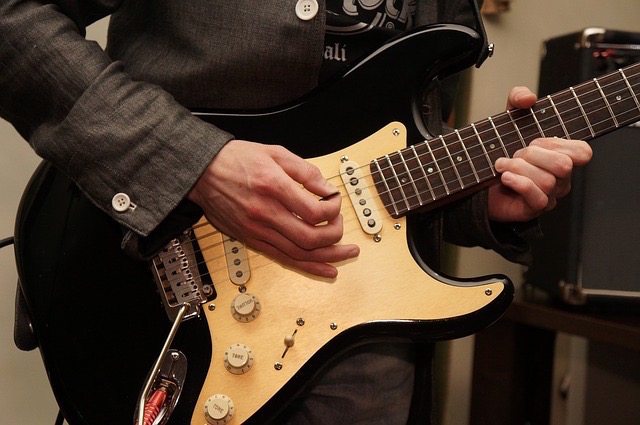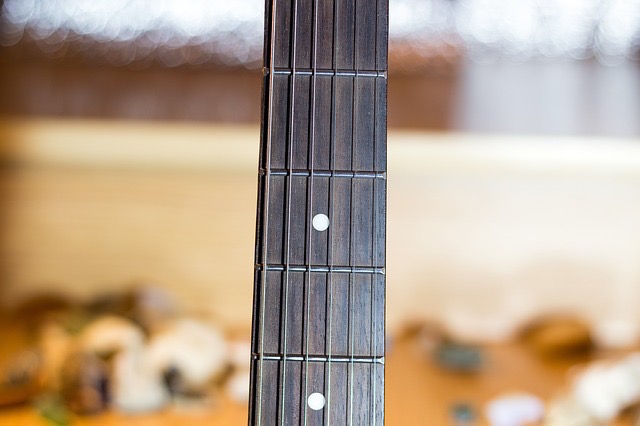Intermediate Guitar Player

The description of an intermediate guitar player is somewhat subjective. Even so, we can come up with some skill and knowledge thresholds to categorize the ballpark an intermediate guitar player would be in.
More often than not, an intermediate player will have some areas and skills that they are strong in, and yet have other areas they may have ignored, or are not aware of. For example, they might have a really good ear, but have little knowledge of what they are doing. Sort of just feeling there way along and making good music as they go.
One thing is for certain, if you have reached an intermediate level of playing, you are demonstrating a passion for the instrument. That is essential to having momentum and moving forward.
How do you know what an intermediate guitar player is? An intermediate guitar player will know where all the notes are on their guitar, they will have a good chord vocabulary, they will know a few scales and be able to play simple solos, and know how to play a few complete songs.

How do you Get To Intermediate Guitar Playing Level
Begin by getting your chord vocabulary built up to include Major Chords, minor chords, Dominant 7 chords, and Major 7 chords. Obviously, there are many more chords than that, but you can do a tremendous amount with just those. There is no short cut to learning these. Drill them and commit them to memory.




Scales an Intermediate Level Player Knows
The minor Pentatonic Scale and the Major Scale are perhaps the two most widely used scales. These are the scales that most players learn first. The minor pentatonic scale is the workhorse in the sense that it is a scale that guitar players love to jam in. It’s perfect for blues an good ‘ol rock-n-roll. There are tons of classic licks built around these notes and the scale fits comfortably in your hand . – – – . . – –
The Major Scale is where we get all of our music theory. So, not only is it a great scale to solo in, but it is also where we learn how notes, and chords, and scales work together. JSIG

Playing Songs
An intermediate guitar player will be able to perform complete songs. It is not unusual to run across guitarists that know only the beginning of a song, or maybe the main riff, but they have never put the whole thing together. Now granted, there are many songs that don’t sound like much without the vocals, Even so, an intermediate guitar player will know how to play a few complete songs. In other words, they are starting to get it. I should say that they are playing complete songs without abrupt starts and stops and with the timing being accurate. The point being that their musicality is starting to come together. They can feel the time, tap their foot, and not lose or add beats.
Using What They Know
A player, at this point, will also start using their scales to play simple solos. In some cases, complex solos thanks to the internet. Their thirst for knowledge is naturally increasing. In some cases they may have learned how to play a complex solo by duplicating what they see and hear on YouTube. However, as much fun as that is, for some in that position they don’t really grasp why the notes they are playing sound so good. This is where a good private instructor can help you advance quickly. If your chops are starting to come together, than the hard part is over. A little knowledge will take you much further.
What You Need To Know to Move Into More Advanced Playing
- Know Where All of The Notes Are On Your Guitar
- Have a strong Foundational Chord Knowledge
- Know the Minor Pentatonic Scale
- Know The Major Scale
- Know How To Play Simple Solos
- Know a few Songs Completely and Flawlessly
Next Step
If you are not already doing so, consider getting a private instructor. You will be amazed at how much faster your learning curve will be. An instructor can easily identify strong and weak points and get you moving and inspired.
Start writing stuff. Either songs, or solos, or licks, or riffs. Start writing and see where your creativity goes. You might start to see your style develop in a more definitive direction.
Also, make part of your practice routine playing something with your eyes closed. This will help your mind focus more intently on the sound. . – – – . . . . . – – . . . – . . – . – . – .
If you have not started to play complete songs yet, make it a goal to get at least 3 songs under your belt. Practice them until they are polished and you feel confident that you can perform them without making mistakes. Better yet, confident that if you do make a mistake you can pull it off, make it work, and keep on playing.
Another indication that you have moved into an intermediate level is that you can play with others and it’s not a struggle. Playing with others is also one on the best things you can do for improving your skills. JSIG
You might start to become more aware of your gear as well. Your equipment might hold you back if it is of a poor quality. As a beginning player, you might not know what a good guitar is. You have not played long enough, or played enough guitars, to get a good understanding of what good action and intonation can do to up your game. As an intermediate player, these things will become more important to you.
